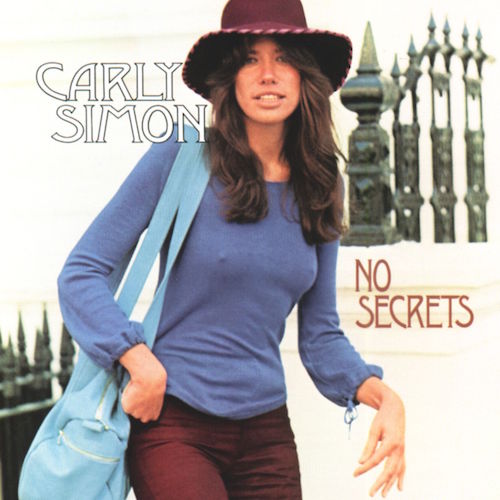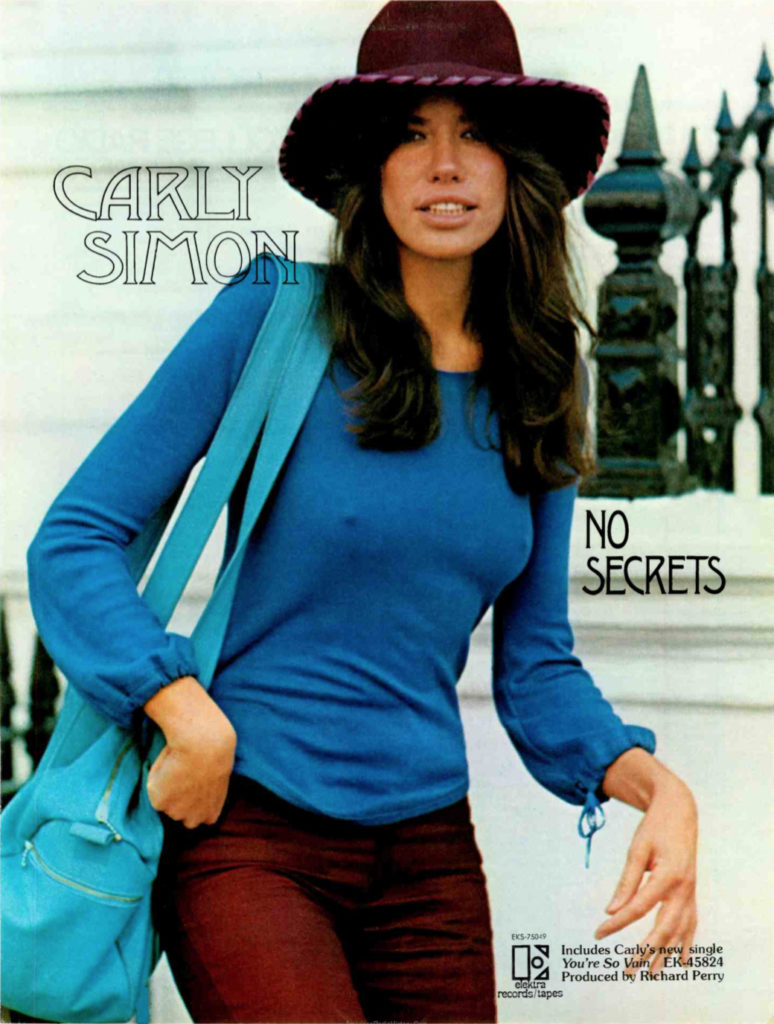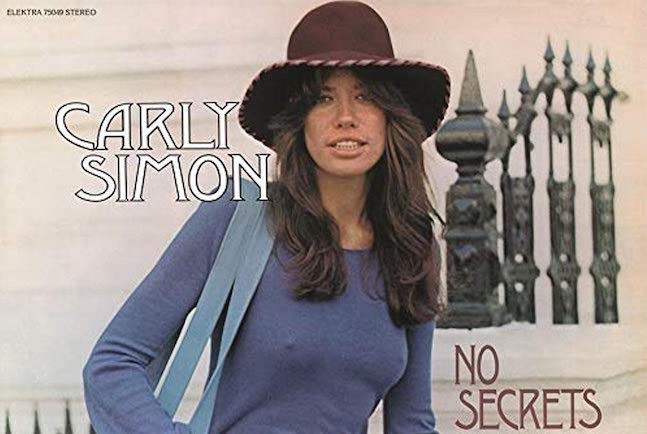 Carly Simon’s “You’re So Vain” is so well known, and has been fascinating audiences for so long, that it’s a bit difficult to remember the song began on a blank notebook page, and then benefited from the recording studio alchemy of musicians who collaborated, argued, got frustrated, and tried another take until, somehow, a little piece of pop music history was born.
Carly Simon’s “You’re So Vain” is so well known, and has been fascinating audiences for so long, that it’s a bit difficult to remember the song began on a blank notebook page, and then benefited from the recording studio alchemy of musicians who collaborated, argued, got frustrated, and tried another take until, somehow, a little piece of pop music history was born.
When it became the #1 hit single in America in December 1972 (staying at the top for three weeks), driving the album No Secrets to a remarkable five weeks at #1 in Billboard on its way to four Grammy nominations, Carly Simon became not only a pop phenomenon, but a gender role model. Her marriage to James Taylor had media worldwide treating the couple like classic Hollywood movie stars, their every move documented and interpreted. But for many female fans, she was the focus, not Taylor. “I felt my womanhood,” Simon recalled years later. “I put on my boots and became part of the feminist movement.”
After some initial sessions with producer-arranger Paul Buckmaster didn’t please Jac Holzman, the boss of her label Elektra, he brought in hitmaker Richard Perry, who’d recently helmed smash albums by Barbra Streisand and Harry Nilsson, to produce what would be her third album. Perry insisted on recording at Trident Studios in London, to take advantage of their ace engineer Robin Cable, his rolodex of British session musicians, and perhaps remove Simon from her husband’s influence so he could direct sessions without interference (Taylor was going to be busy promoting his new album One Man Dog). Bill Schnee was also available for engineering and remixing.

In a documentary about the making of No Secrets, Simon described Perry as “very dominating and very good,” and said she often fought with him as he applied his pop sensibilities to songs she conceived more in the folk vein, along the lines of her idols Judy Collins, Odetta and Joan Baez. For instance, the album opener “The Right Thing to Do” was originally conceived by Simon as a slow, ruminative piece, but Perry increased the tempo and expanded the sound, adding female backing vocals, Ray Cooper’s conga, and strings and brass (arranged by Kirby Johnson) joining Simon’s piano. Carly’s trusted guitarist Jimmy Ryan plays bass and veteran Andy Newmark is the drummer. Ryan is an important part of the album: Simon explained, “I leaned on him for emotional support and musical support.”
The lyrics were written with James Taylor in mind: “There’s nothing you can do to turn me away/Nothing anyone can say/You’re with me now and as long as you stay/Loving you’s the right thing to do.” Simon, who once said, “I fell in love every time I slept with a man,” uses the metaphor of a river to indicate her own dalliances—when she was “just a little too free”—are now in the past. In Simon’s hands, it’s a statement of maturity and strength, and it resonates strongly with women to this day. Her vocal is confident and supple.
“The Carter Family” is one of two songs written with screenwriter/journalist Jacob Brackman, Simon’s longtime (platonic) friend and frequent lyric collaborator. The storytelling is evocative: “The Carter family lived next door for almost 14 years/With Gwen and I inseparable from rag dolls through brassieres/Then Gwen began to bore me with her giggles and her fears/The day the Carters moved away I had to fake my tears.” The track has a nice swing to it, Newmark paired with Klaus Voormann on bass.
“You’re So Vain” is next. It begins with Voormann’s bass figure, which he says he developed from a warm-up finger exercise to portray the “flash” he figured the protagonist in the lyrics had. Perry took notice, dragging it to the track and then into an opening position. Block piano chords and Simon whispering “son of a gun” in admiration of Voormann’s dexterity create a dramatic, somewhat eerie intro. “You walked into the party like you were walking onto a yacht” is the brilliant opening image; the cocked hat and apricot scarf, says Simon, are details she witnessed firsthand. According to Simon, the pompous ass who thinks the song is about him is based on three different men, only one of which she identifies as Warren Beatty.
Watch Simon sing her massive hit live in 2005
Simon says Richard Perry made her do the lead vocal a hundred times. In turn, he says Simon was so “turned on” after doing background vocals with Mick Jagger she insisted on doing another master take, and that turned out to be the vocal they used. As more evidence of his perfectionism, Perry didn’t like what Andy Newmark was doing in rehearsals of the song, and brought in Jim Gordon on drums, who nailed his part. Ryan says he did his guitar solo in one take, but Perry—who routinely showed up hours late for sessions, and has different memories—insists it took the better part of a weekend. The witty string arrangement is by Carly herself.
Related: Read more about Carly’s classic, “You’re So Vain”
“His Friends Are More Than Fond of Robin” has a hint of Stephen Sondheim, a delicate chorus of synthesizers played by David Hentschel, lovely piano from Simon (subtly echoed by Ryan’s acoustic), and lyrics that are probably a tribute to Brackman: “Robin, I’ve never told you/But I’ll be yours until we’re old/Please learn to call me in your dreams/The way I’m looking at you is just as it seems.” The track is spare, emotional and as perfect as anything on the album.
“We Have No Secrets” ends the first LP side, lending its title to the album after several other possibilities were raised and discarded. The lyrics are again about Taylor, informed by her knowledge of his previous addictions and affairs: “In the name of honesty, in the name of what is fair/You always answer my questions/But they don’t always answer my prayers.” This is the clear-eyed, self-aware and intelligent feminism that resonated so strongly with Simon’s fans in the early ’70s.
“We Have No Secrets” was created from a couple dozen takes, and features an extraordinary guitar solo from Ryan, based (he says) on the sound of humpbacked whales. He used pedal effects on his Gibson, and Perry added plenty of echo. Ryan, Paul Keogh and Simon weave in bright acoustic guitars, Voormann’s bass is very active, Jim Gordon gives the track some tricky rhythmic oomph, and Kirby provides another outstanding string arrangement and plays electric piano as well.
“Embrace Me, You Child” leads off the second side with complexity in the lyrics, playing and singing. Originally written on 12-string guitar, the song blossomed in the studio, with Simon executing some difficult tempo changes and vocal leaps; according to string arranger Buckmaster, she doubled the top violin melody after the orchestra was recorded. Simon says the lyrics refer to her sometimes difficult upbringing in a patrician family: “The attention I needed from men was really attention I needed from my father.”
Lowell George (slide guitar) and Bill Payne (organ) from Little Feat, drummer Jim Keltner and pianist Nicky Hopkins join the cast for “Waited So Long.” James Taylor is listed as background vocalist too, which indicates either there were (uncredited) overdubbing sessions in the U.S. after the Trident sessions, or Elektra’s travel budget was stretched to accommodate transatlantic visitors. The best thing about the track is George’s work, otherwise it’s pretty much a dud.
“It Was So Easy” is another Simon-Brackman co-write, with lyrics that seem to hearken back to 1968 and the duo’s time as camp counselors in the Berkshires: “I remember a time romping through the woods/Sun against our skin instead of clothes/When we felt hungry we would eat/When we felt glad we would dance/And whenever we felt drowsy we would doze.” Simon casts it as a charming, campfire-friendly folk song, with Ryan evoking both the Lovin’ Spoonful’s Zal Yanovsky in his fingerpicked electric lines, and (as he explained in the No Secrets documentary) his admiration for Jerry Garcia’s pedal steel part in CSNY’s “Teach Your Children.”
“Night Owl” is by James Taylor, and is produced as a gospel rave-up with Bobby Keys on saxophone, Hopkins, Keltner and Cooper doing their things, and a distinguished chorus (Paul and Linda McCartney, Bonnie Bramlett, Doris Troy). The song, a homage to a Greenwich Village club, was originally recorded by Taylor’s group Flying Machine, and again for his debut solo album on Apple, but it doesn’t really fit Simon, hard as she tries to sell it.
Fortunately, the set concludes with another winner, “When You Close Your Eyes,” co-written with Billy Mernit, a musical jack-of-many-trades who also met Simon in the Berkshires. Mernit, who claims he supplied the “clouds in my coffee” image for “You’re So Vain,” told journalist Kenneth Walsh, “Carly and I used to like to sit at the piano and play four-handed, especially when we were writing together.” One day, Simon had the first verse of “When You Close Your Eyes” and Mernit was helping with lyrics. “Really what that song lacked was a bridge,” he explained. “We played the chorus, and Carly said, ‘What we need here is a big surprise,’ so I just banged my hands down on a different chord, and sang ‘Big surprise!’ We both cracked up, but it worked.” The sweeping Buckmaster string arrangement elevates the song, full of emotion and joy, to an exceptional finale for the LP, which arrived on November 16, 1972.
Ed Caraeff took the cover photo impromptu in London as Simon left the Portobello Hotel, about to get into a cab. After some discussion about whether to airbrush the bra-less Simon’s nipples out of the photograph, she decided she was comfortable with the look; sexy and smart could co-exist.
Simon’s influence continues, sometimes in unlikely places, as when Taylor Swift brought her on stage to duet “You’re So Vain” in 2013, or when Morrissey recorded “When You Close Your Eyes” on his 2019 album California Son. Her memoir Boys In The Trees came out in 2016, the same year she issued her most recent recording “I Can’t Thank You Enough,” a new song she wrote and performed with her son Ben Taylor. After years of being overlooked by the Rock & Roll Hall of Fame, she was finally inducted in the Class of 2022.
Watch Carly sing “When You Close Your Eyes” with James Taylor
- Patti Smith’s ‘Horses’: Poetry In Motion - 05/21/2024
- Elton John ‘Honky Chateau’: New Heights - 05/19/2024
- Paul Simon ‘There Goes Rhymin’ Simon’: American Tunes - 05/05/2024


1 Comment
As a 16 year old in 1972, I had a 29″ x 30″ poster of this album cover, which I obtained from a local radio station, tacked onto my bedroom wall.(Along with Easy Rider and Butch Cassidy and the Sundance Kid’s ending scene)
I not only enjoyed Ms. Simon’s musical output during those “Wonder Years”, but was enamored with her distinctive appearance.
Call me misogynistic, if the P. C. police is ghosting- I couldn’t care less – I’ll wear that mantle proudly, as I have fond memories of my teen years, and now classic music, in a freer America.